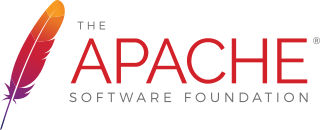
Free software, libre software, or libreware is computer software distributed under terms that allow users to run the software for any purpose as well as to study, change, and distribute it and any adapted versions. Free software is a matter of liberty, not price; all users are legally free to do what they want with their copies of a free software regardless of how much is paid to obtain the program. Computer programs are deemed "free" if they give end-users ultimate control over the software and, subsequently, over their devices.
The Q Public License (QPL) is a non-copyleft license, created by Trolltech for its free edition of the Qt. It was used until Qt 3.0, as Trolltech toolkit version 4.0 was released under GPL version 2.

The Apache License is a permissive free software license written by the Apache Software Foundation (ASF). It allows users to use the software for any purpose, to distribute it, to modify it, and to distribute modified versions of the software under the terms of the license, without concern for royalties. The ASF and its projects release their software products under the Apache License. The license is also used by many non-ASF projects.
The Open Software License (OSL) is a software license created by Lawrence Rosen. The Open Source Initiative (OSI) has certified it as an open-source license, but the Debian project judged version 1.1 to be incompatible with the DFSG. The OSL is a copyleft license, with a termination clause triggered by filing a lawsuit alleging patent infringement.
The Mozilla Public License (MPL) is a free and open-source weak copyleft license for most Mozilla Foundation software such as Firefox and Thunderbird. The MPL license is developed and maintained by Mozilla, which seeks to balance the concerns of both open-source and proprietary developers; it is distinguished from others as a middle ground between the permissive software BSD-style licenses and the General Public License. So under the terms of the MPL, it allows the integration of MPL-licensed code into proprietary codebases, but only on condition those components remain accessible.
The Common Development and Distribution License (CDDL) is a free and open-source software license, produced by Sun Microsystems, based on the Mozilla Public License (MPL). Files licensed under the CDDL can be combined with files licensed under other licenses, whether open source or proprietary. In 2005 the Open Source Initiative approved the license. The Free Software Foundation (FSF) considers it a free software license, but one which is incompatible with the GNU General Public License (GPL).
A permissive software license, sometimes also called BSD-like or BSD-style license, is a free-software license which instead of copyleft protections, carries only minimal restrictions on how the software can be used, modified, and redistributed, usually including a warranty disclaimer. Examples include the GNU All-permissive License, MIT License, BSD licenses, Apple Public Source License and Apache license. As of 2016, the most popular free-software license is the permissive MIT license.
The IBM Public License (IPL) is a free open-source software license written and occasionally used by IBM. It is approved by the Free Software Foundation (FSF) and described as an "open-source license" by the Open Source Initiative.

The Eclipse Public License (EPL) is a free and open source software license most notably used for the Eclipse IDE and other projects by the Eclipse Foundation. It replaces the Common Public License (CPL) and removes certain terms relating to litigations related to patents.

The Python Software Foundation License (PSFL) is a BSD-style, permissive software license which is compatible with the GNU General Public License (GPL). Its primary use is for distribution of the Python project software and its documentation. Since the license is permissive, it allows proprietization of the derivations. The PSFL is listed as approved on both FSF's approved licenses list, and OSI's approved licenses list.
This comparison only covers software licenses which have a linked Wikipedia article for details and which are approved by at least one of the following expert groups: the Free Software Foundation, the Open Source Initiative, the Debian Project and the Fedora Project. For a list of licenses not specifically intended for software, see List of free-content licences.
The Sybase Open Watcom Public Licence is a software license that has been approved by the Open Source Initiative. It is the licence under which the Open Watcom C/C++ compiler is released.
The Affero General Public License is a free software license. The first version of the Affero General Public License (AGPLv1), was published by Affero, Inc. in March 2002, and based on the GNU General Public License, version 2 (GPLv2). The second version (AGPLv2) was published in November 2007, as a transitional license to allow an upgrade path from AGPLv1 to the GNU Affero General Public License.
License proliferation is the phenomenon of an abundance of already existing and the continued creation of new software licenses for software and software packages in the FOSS ecosystem. License proliferation affects the whole FOSS ecosystem negatively by the burden of increasingly complex license selection, license interaction, and license compatibility considerations.
License compatibility is a legal framework that allows for pieces of software with different software licenses to be distributed together. The need for such a framework arises because the different licenses can contain contradictory requirements, rendering it impossible to legally combine source code from separately-licensed software in order to create and publish a new program. Proprietary licenses are generally program-specific and incompatible; authors must negotiate to combine code. Copyleft licenses are commonly deliberately incompatible with proprietary licenses, in order to prevent copyleft software from being re-licensed under a proprietary license, turning it into proprietary software. Many copyleft licenses explicitly allow relicensing under some other copyleft licenses. Permissive licenses are compatible with everything, including proprietary licenses; there is thus no guarantee that all derived works will remain under a permissive license.

A free-software license is a notice that grants the recipient of a piece of software extensive rights to modify and redistribute that software. These actions are usually prohibited by copyright law, but the rights-holder of a piece of software can remove these restrictions by accompanying the software with a software license which grants the recipient these rights. Software using such a license is free software as conferred by the copyright holder. Free-software licenses are applied to software in source code and also binary object-code form, as the copyright law recognizes both forms.
BSD licenses are a family of permissive free software licenses, imposing minimal restrictions on the use and distribution of covered software. This is in contrast to copyleft licenses, which have share-alike requirements. The original BSD license was used for its namesake, the Berkeley Software Distribution (BSD), a Unix-like operating system. The original version has since been revised, and its descendants are referred to as modified BSD licenses.

The GNU General Public License is a series of widely used free software licenses that guarantee end users the four freedoms to run, study, share, and modify the software. The license was the first copyleft for general use and was originally written by Richard Stallman, the founder of the Free Software Foundation (FSF), for the GNU Project. The license grants the recipients of a computer program the rights of the Free Software Definition. These GPL series are all copyleft licenses, which means that any derivative work must be distributed under the same or equivalent license terms. It is more restrictive than the Lesser General Public License and even further distinct from the more widely used permissive software licenses BSD, MIT, and Apache.

The GNU Free Documentation License is a copyleft license for free documentation, designed by the Free Software Foundation (FSF) for the GNU Project. It is similar to the GNU General Public License, giving readers the rights to copy, redistribute, and modify a work and requires all copies and derivatives to be available under the same license. Copies may also be sold commercially, but, if produced in larger quantities, the original document or source code must be made available to the work's recipient.
Software relicensing is applied in open-source software development when software licenses of software modules are incompatible and are required to be compatible for a greater combined work. Licenses applied to software as copyrightable works, in source code as binary form, can contain contradictory clauses. These requirements can make it impossible to combine source code or content of several software works to create a new combined one.






